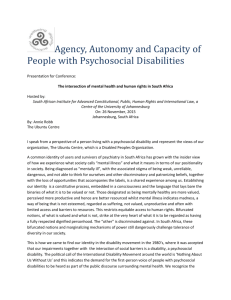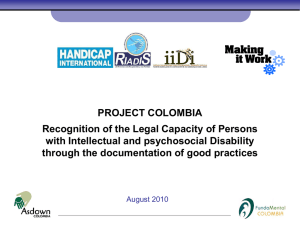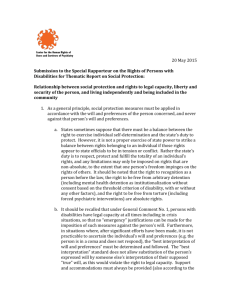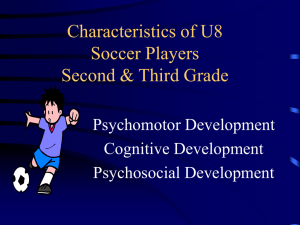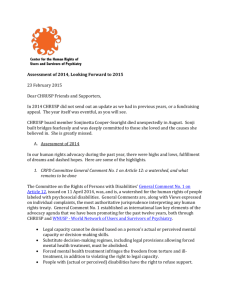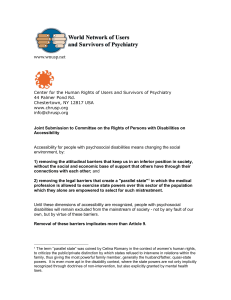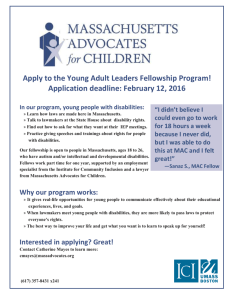WNUSP - Center for the Human Rights of Users and Survivors of
advertisement
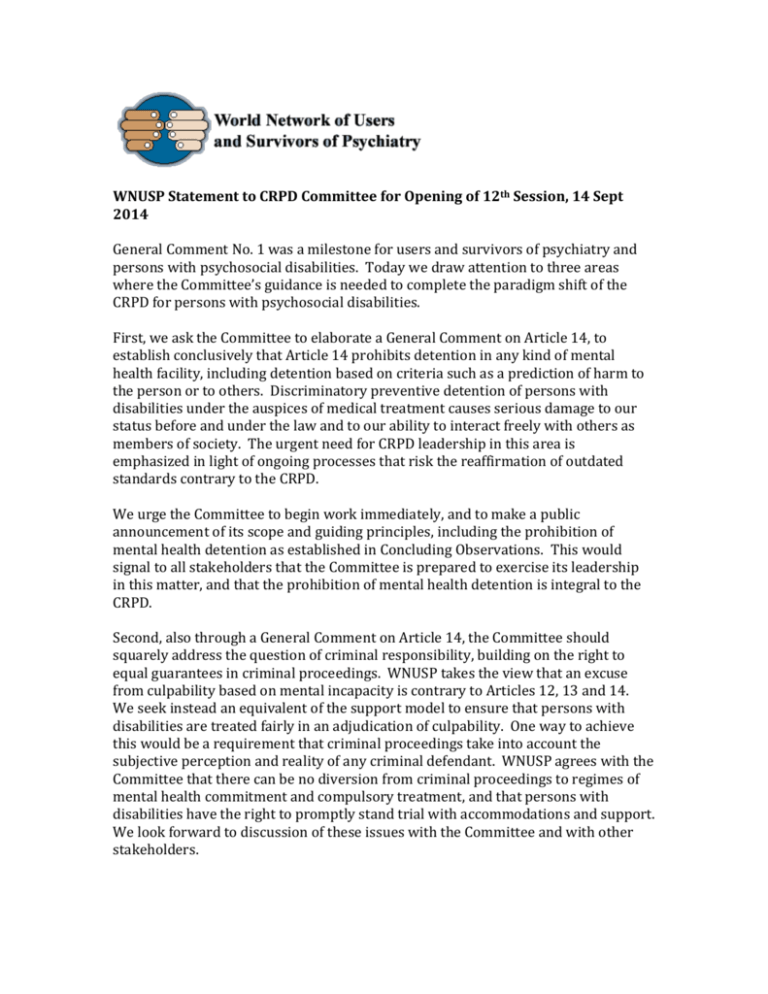
WNUSP Statement to CRPD Committee for Opening of 12th Session, 14 Sept 2014 General Comment No. 1 was a milestone for users and survivors of psychiatry and persons with psychosocial disabilities. Today we draw attention to three areas where the Committee’s guidance is needed to complete the paradigm shift of the CRPD for persons with psychosocial disabilities. First, we ask the Committee to elaborate a General Comment on Article 14, to establish conclusively that Article 14 prohibits detention in any kind of mental health facility, including detention based on criteria such as a prediction of harm to the person or to others. Discriminatory preventive detention of persons with disabilities under the auspices of medical treatment causes serious damage to our status before and under the law and to our ability to interact freely with others as members of society. The urgent need for CRPD leadership in this area is emphasized in light of ongoing processes that risk the reaffirmation of outdated standards contrary to the CRPD. We urge the Committee to begin work immediately, and to make a public announcement of its scope and guiding principles, including the prohibition of mental health detention as established in Concluding Observations. This would signal to all stakeholders that the Committee is prepared to exercise its leadership in this matter, and that the prohibition of mental health detention is integral to the CRPD. Second, also through a General Comment on Article 14, the Committee should squarely address the question of criminal responsibility, building on the right to equal guarantees in criminal proceedings. WNUSP takes the view that an excuse from culpability based on mental incapacity is contrary to Articles 12, 13 and 14. We seek instead an equivalent of the support model to ensure that persons with disabilities are treated fairly in an adjudication of culpability. One way to achieve this would be a requirement that criminal proceedings take into account the subjective perception and reality of any criminal defendant. WNUSP agrees with the Committee that there can be no diversion from criminal proceedings to regimes of mental health commitment and compulsory treatment, and that persons with disabilities have the right to promptly stand trial with accommodations and support. We look forward to discussion of these issues with the Committee and with other stakeholders. 2 Third, we ask the Committee to address the shift from a medical model to a social model of psychosocial disability, through its elaboration of a General Comment on Article 19. There is a common misunderstanding that Article 19 as applied to persons with psychosocial disabilities means the transfer of individuals from closed institutions to community-based mental health services. That approach reinforces the medical model and is detrimental to the realization of our full human rights. From the point of view of WNUSP, Article 19 allows us to step outside the “health” context and consider the needs expressed by people with psychosocial disabilities in all areas of our lives. For example, needs may be met through the cultivation of naturally-occurring supports in the community, by practical supports provided by a personal assistant or service animal, and by more programmatic and holistic approaches to well-being rather than restricting recovery opportunities to the medical model of mental health. Articles 27 and 28, right to work and right to an adequate standard of living, are closely related to our inclusion in the community and must be addressed together with Article 19. The shift from medical model to social model needs to incorporate a critique of false and corrupt scientific practices in the mental health field, in research and in clinical practice, which perpetuate misinformation and create barriers to full inclusion of persons with psychosocial disabilities in society. These practices, which are well documented, must be exposed to human rights analysis and scrutiny. Article 19, which embodies the social model of disability and inclusive community, offers an ideal standpoint from which to address the social harms caused by medical-model practice. In criticizing the medical model, WNUSP is not calling for elimination of medicallyoriented services such as general and holistic health-care and psychiatric medication. These services, among other options for well-being, must be provided, based on free and informed consent of the person concerned, to those who desire the service including those who are unable to pay. We aim to facilitate honest debate and policy-making, based on a social model of psychosocial disability that acknowledges diversity of experiences and viewpoints. Repeal of legislative provisions that authorize deprivation of liberty of persons with psychosocial disabilities by medical personnel is fundamental to the creation of inclusive community under Article 19, as well as being a central obligation of Article 14 and the freedom from arbitrary detention. In sum: We urge the Committee to immediately start work on a General Comment on Article 14, and to make a public announcement outlining the scope and guiding principles including the prohibition of mental health detention. This General Comment should also address criminal responsibility and equal guarantees in the context of criminal proceedings and penalties. We urge the Committee to incorporate into a General Comment on Article 19 an explanation of the shift from a medical model to a social model of psychosocial disability. WNUSP is fully prepared to support the Committee 3 in these initiatives, and will promote the active involvement by experts throughout our global networks, including persons with psychosocial disabilities as well as valued allies. Thank you. Contact: Tina Minkowitz, International Representative of WNUSP tminkowitz@earthlink.net +1 518 321 9839
